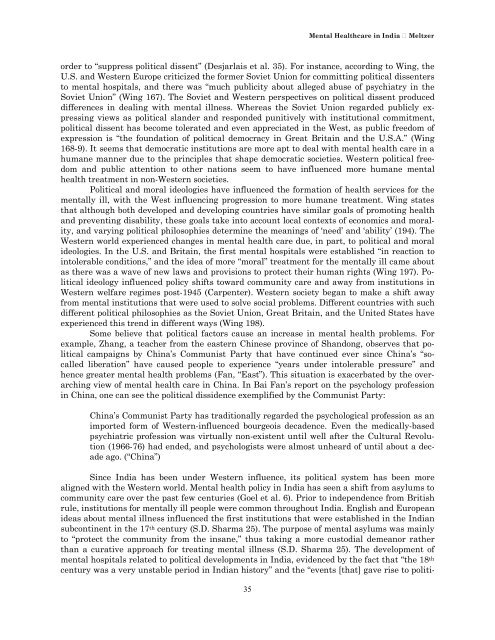Pepperdine University School of Public Policy
Pepperdine University School of Public Policy
Pepperdine University School of Public Policy
Create successful ePaper yourself
Turn your PDF publications into a flip-book with our unique Google optimized e-Paper software.
Mental Healthcare in India Meltzer<br />
order to “suppress political dissent” (Desjarlais et al. 35). For instance, according to Wing, the<br />
U.S. and Western Europe criticized the former Soviet Union for committing political dissenters<br />
to mental hospitals, and there was “much publicity about alleged abuse <strong>of</strong> psychiatry in the<br />
Soviet Union” (Wing 167). The Soviet and Western perspectives on political dissent produced<br />
differences in dealing with mental illness. Whereas the Soviet Union regarded publicly expressing<br />
views as political slander and responded punitively with institutional commitment,<br />
political dissent has become tolerated and even appreciated in the West, as public freedom <strong>of</strong><br />
expression is “the foundation <strong>of</strong> political democracy in Great Britain and the U.S.A.” (Wing<br />
168-9). It seems that democratic institutions are more apt to deal with mental health care in a<br />
humane manner due to the principles that shape democratic societies. Western political freedom<br />
and public attention to other nations seem to have influenced more humane mental<br />
health treatment in non-Western societies.<br />
Political and moral ideologies have influenced the formation <strong>of</strong> health services for the<br />
mentally ill, with the West influencing progression to more humane treatment. Wing states<br />
that although both developed and developing countries have similar goals <strong>of</strong> promoting health<br />
and preventing disability, these goals take into account local contexts <strong>of</strong> economics and morality,<br />
and varying political philosophies determine the meanings <strong>of</strong> ‘need’ and ‘ability’ (194). The<br />
Western world experienced changes in mental health care due, in part, to political and moral<br />
ideologies. In the U.S. and Britain, the first mental hospitals were established “in reaction to<br />
intolerable conditions,” and the idea <strong>of</strong> more “moral” treatment for the mentally ill came about<br />
as there was a wave <strong>of</strong> new laws and provisions to protect their human rights (Wing 197). Political<br />
ideology influenced policy shifts toward community care and away from institutions in<br />
Western welfare regimes post-1945 (Carpenter). Western society began to make a shift away<br />
from mental institutions that were used to solve social problems. Different countries with such<br />
different political philosophies as the Soviet Union, Great Britain, and the United States have<br />
experienced this trend in different ways (Wing 198).<br />
Some believe that political factors cause an increase in mental health problems. For<br />
example, Zhang, a teacher from the eastern Chinese province <strong>of</strong> Shandong, observes that political<br />
campaigns by China’s Communist Party that have continued ever since China’s “socalled<br />
liberation” have caused people to experience “years under intolerable pressure” and<br />
hence greater mental health problems (Fan, “East”). This situation is exacerbated by the overarching<br />
view <strong>of</strong> mental health care in China. In Bai Fan’s report on the psychology pr<strong>of</strong>ession<br />
in China, one can see the political dissidence exemplified by the Communist Party:<br />
China’s Communist Party has traditionally regarded the psychological pr<strong>of</strong>ession as an<br />
imported form <strong>of</strong> Western-influenced bourgeois decadence. Even the medically-based<br />
psychiatric pr<strong>of</strong>ession was virtually non-existent until well after the Cultural Revolution<br />
(1966-76) had ended, and psychologists were almost unheard <strong>of</strong> until about a decade<br />
ago. (“China”)<br />
Since India has been under Western influence, its political system has been more<br />
aligned with the Western world. Mental health policy in India has seen a shift from asylums to<br />
community care over the past few centuries (Goel et al. 6). Prior to independence from British<br />
rule, institutions for mentally ill people were common throughout India. English and European<br />
ideas about mental illness influenced the first institutions that were established in the Indian<br />
subcontinent in the 17 th century (S.D. Sharma 25). The purpose <strong>of</strong> mental asylums was mainly<br />
to “protect the community from the insane,” thus taking a more custodial demeanor rather<br />
than a curative approach for treating mental illness (S.D. Sharma 25). The development <strong>of</strong><br />
mental hospitals related to political developments in India, evidenced by the fact that “the 18 th<br />
century was a very unstable period in Indian history” and the “events [that] gave rise to politi-<br />
35












